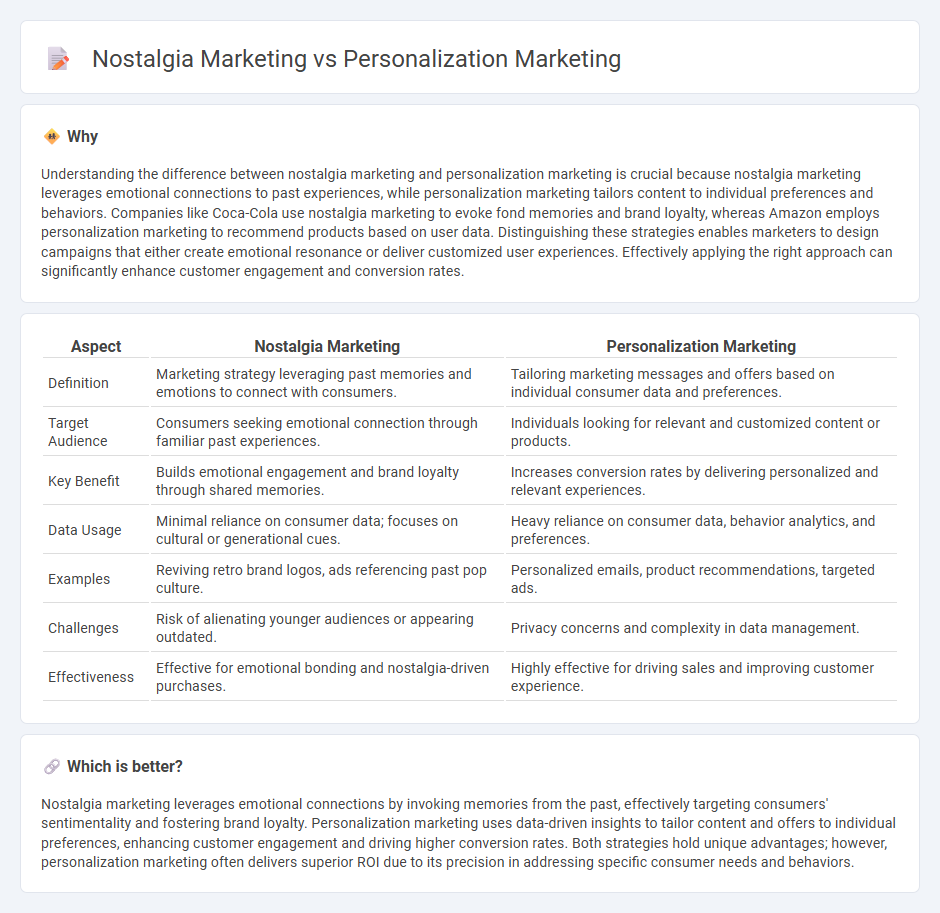
Nostalgia marketing leverages consumers' emotional connections to past experiences by reviving familiar symbols, sounds, and themes that trigger fond memories and brand loyalty. Personalization marketing uses data-driven insights to tailor messages, products, and offers to individual preferences, enhancing engagement and conversion rates. Explore how these distinct approaches can transform your marketing strategy.
Why it is important
Understanding the difference between nostalgia marketing and personalization marketing is crucial because nostalgia marketing leverages emotional connections to past experiences, while personalization marketing tailors content to individual preferences and behaviors. Companies like Coca-Cola use nostalgia marketing to evoke fond memories and brand loyalty, whereas Amazon employs personalization marketing to recommend products based on user data. Distinguishing these strategies enables marketers to design campaigns that either create emotional resonance or deliver customized user experiences. Effectively applying the right approach can significantly enhance customer engagement and conversion rates.
Comparison Table
| Aspect | Nostalgia Marketing | Personalization Marketing |
|---|---|---|
| Definition | Marketing strategy leveraging past memories and emotions to connect with consumers. | Tailoring marketing messages and offers based on individual consumer data and preferences. |
| Target Audience | Consumers seeking emotional connection through familiar past experiences. | Individuals looking for relevant and customized content or products. |
| Key Benefit | Builds emotional engagement and brand loyalty through shared memories. | Increases conversion rates by delivering personalized and relevant experiences. |
| Data Usage | Minimal reliance on consumer data; focuses on cultural or generational cues. | Heavy reliance on consumer data, behavior analytics, and preferences. |
| Examples | Reviving retro brand logos, ads referencing past pop culture. | Personalized emails, product recommendations, targeted ads. |
| Challenges | Risk of alienating younger audiences or appearing outdated. | Privacy concerns and complexity in data management. |
| Effectiveness | Effective for emotional bonding and nostalgia-driven purchases. | Highly effective for driving sales and improving customer experience. |
Which is better?
Nostalgia marketing leverages emotional connections by invoking memories from the past, effectively targeting consumers' sentimentality and fostering brand loyalty. Personalization marketing uses data-driven insights to tailor content and offers to individual preferences, enhancing customer engagement and driving higher conversion rates. Both strategies hold unique advantages; however, personalization marketing often delivers superior ROI due to its precision in addressing specific consumer needs and behaviors.
Connection
Nostalgia marketing leverages consumers' emotional connections to past experiences, enhancing engagement by evoking fond memories. Personalization marketing tailors content and offers based on individual consumer data, creating a more relevant and immersive experience. Combining these strategies intensifies brand loyalty by delivering personalized nostalgic content that resonates deeply with target audiences.
Key Terms
**Personalization Marketing:**
Personalization marketing targets individual consumer preferences using data analytics and AI to deliver tailored content, product recommendations, and promotions that enhance user engagement and conversion rates. This strategy boosts customer loyalty by creating unique experiences based on browsing behavior, purchase history, and demographic information. Explore more about how personalization marketing drives business growth and customer satisfaction.
Data Analytics
Personalization marketing leverages customer data analytics to tailor messages and offers based on individual preferences, behaviors, and purchase history, enhancing engagement and conversion rates. Nostalgia marketing uses analytics to identify demographic segments with emotional connections to past eras, crafting campaigns that evoke fond memories and foster brand loyalty. Explore how integrating data analytics in these strategies can optimize customer targeting and maximize marketing ROI.
Customer Segmentation
Personalization marketing leverages detailed customer segmentation to deliver tailored content based on individual preferences, behaviors, and demographics, enhancing engagement and conversion rates. Nostalgia marketing targets customer segments by evoking familiar emotions linked to past experiences, often segmenting by age or cultural background to resonate deeply and foster brand loyalty. Explore how combining these segmentation strategies can optimize your marketing effectiveness.
Source and External Links
Marketing personalization -- what it is, why it matters, and examples - Marketing personalization uses data on individual customers' interests, demographics, and behavior to deliver tailored brand messages, creating one-to-one experiences that boost engagement, loyalty, and conversions, exemplified by companies like Netflix and Amazon.
What Is Personalized Marketing? - Emarsys - Personalized marketing tailors communications based on customer data and preferences across multiple channels, leveraging AI and behavioral insights for relevant offers that improve engagement and drive sales in industries like retail and hospitality.
Personalization In Marketing | West Virginia University - Personalized marketing is a strategy that uses collected customer data on preferences and behaviors to craft relevant, meaningful messages that engage each consumer as an individual, strengthening the connection between business and customer.
 dowidth.com
dowidth.com